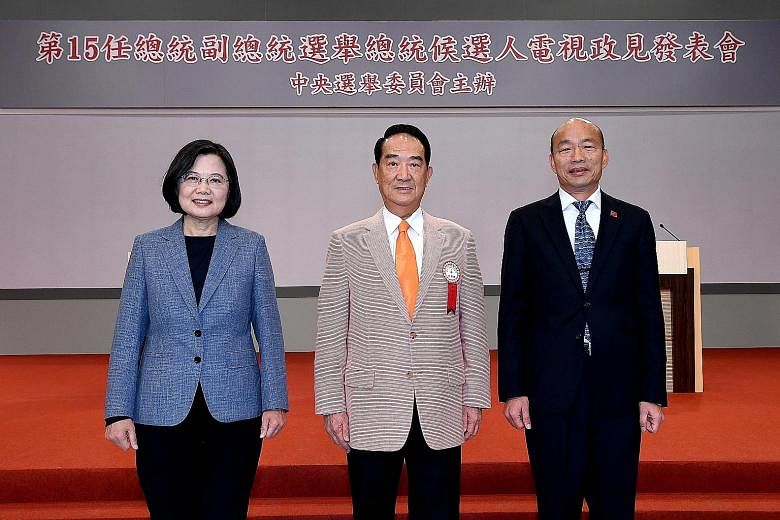TAIPEI • What Communist Party rulers in China fear the most is Taiwan's democracy, President Tsai Ing-wen said yesterday, describing Beijing as a threat seeking every day to undermine Taiwan.
Ms Tsai, who faces re-election on Jan 11, has repeatedly warned of the danger posed to self-ruled Taiwan by China, which claims the island as its own territory, to be brought under control by force if needed.
In a live televised pre-election policy address by the three presidential candidates, Ms Tsai accused Taiwan's main opposition party, the Kuomintang (KMT), of cosying up to China, pointing to its presidential hopeful Han Kuo-yu's meeting with senior Chinese officials earlier this year.
"What China fears the most is the unity of Taiwan's people.
"What China fears the most is Taiwan's democracy," said Ms Tsai, from the pro-independence Democratic Progressive Party (DPP). "We must be aware that China is infiltrating and dividing Taiwan's society in an all-round way."
Referring to the anti-government protests in Chinese-ruled Hong Kong, Ms Tsai said Taiwan cannot accept "one country, two systems" - the method Beijing uses to rule the city which is meant to grant a high degree of autonomy and which China hopes eventually to apply to Taiwan.
"The situation in Hong Kong makes it very clear to all of us that democracy and authoritarianism are in conflict. The two systems cannot coexist in one country," she added.
Mr Han, trailing in the polls, said Ms Tsai was being unfair in trying to brand him as selling out Taiwan, and pointed out that she and some of her senior colleagues had been to China to meet top Chinese officials previously.
"Who dares to say that your team does not love Taiwan?" said Mr Han, the Mayor of the southern port city of Kaohsiung. He added that his trip was to try to promote Taiwan agricultural exports to China and attract Chinese tourists.
"Why can you go and it's not selling out Taiwan's sovereignty, but when I go, it is?" he added.
The third candidate is China-friendly People First Party's chairman James Soong. His campaign has been seen as likely to hurt the chances of Mr Han, since both men draw support from voters who favour the status quo of de facto independence combined with continued exchanges with China.
Cross-strait relations have soured since Ms Tsai won office in 2016. Ms Tsai says Taiwan is already an independent nation, called the Republic of China, Taiwan's official name. The KMT, which ruled China before fleeing to Taiwan in 1949 at the end of a civil war with the Communists, advocates close ties with China.
Ahead of the Jan 11 presidential and legislative elections, Taiwan is also ramping up efforts to combat fake news and disinformation that the government says China is bombarding the island with, to undermine its democracy.
The KMT is crying foul, accusing the ruling DPP of running its own disinformation campaign, saying the threat is closer to home.
Accusations of dirty doings, denials and counter-denials are part and parcel of political life on the island, played out on its many cable news channels and online, mostly on Facebook, messaging app Line and the Taiwan-focused bulletin board PTT.
"Taiwan is a democratic, open society. They are using our freedom and openness, bringing in news that is not beneficial to the government," said Mr Chiu Chui-cheng, deputy head of Taiwan's Mainland Affairs Council, referring to China.
"They are seeking to confuse the perception of people. It's a perception war," he said. "Mainland China uses organisations in Taiwan to help disseminate fake news."
But Mr Han says voters should focus on what the DPP is doing to muddy the waters, and should stop trying to "smear them red" - a reference to the colours of China's Communist Party.
"Have a look on the Internet, isn't about more than 90 per cent of online news attacks against Han Kuo-yu?" his campaign spokesman Anne Wang said. She noted almost nobody on the PTT bulletin board supported the KMT, which undermined the DPP's complaints of Beijing's interference on behalf of the opposition party.
"If mainland China wants to support the Kuomintang, how can that be the result?" she asked.
REUTERS

